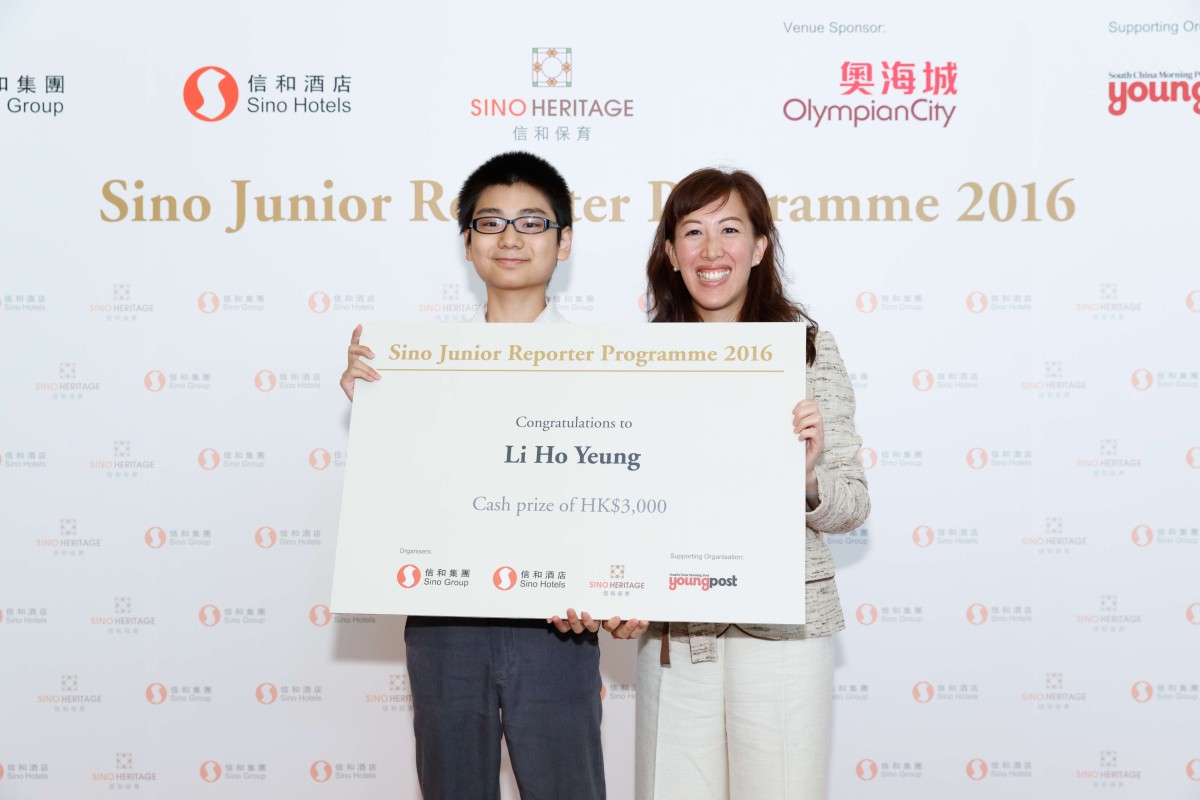
Chef Yuen holds fast to his belief that Hong Kong’s culinary heritage is irreplaceable - for reasons more than the marvelous tastes.
 This image may be republished, Nikki Ng (R) presents the award to champion, Li Ho-yeung of Sing Yi Secondary School.
This image may be republished, Nikki Ng (R) presents the award to champion, Li Ho-yeung of Sing Yi Secondary School.In June, 60 aspiring secondary students took part in the Sino Junior Reporter Programme 2016 organised by Sino Group and Young Post of South China Morning Post to delve deeper into journalism and food culture.
They interviewed Kenneth Yuen, Executive Chef of the Royal Pacific Hotel and Towers, to find out more about Hong Kong’s culinary heritage. They also savoured Yuen’s signature heritage dishes, ranging from Hong-Kong style barbecue pork buns and Swiss chicken legs, to “lo po pang” (or wife cake) and “put chai ko”, a red bean pudding popular in Hong Kong.
Behind the mouth-watering local treats, there are fascinating stories many young people haven’t heard. According to Yuen, the Swiss wing originated in Tai Ping Koon Restaurant. And the story goes like this: One day a foreigner ordered some chicken wings in the restaurant. Satisfied, he praised the flavor as ‘sweet wings’. The waiter misheard it as “Swiss wings”! So despite its name, Swiss wings is a hundred per cent local dish.
One of Yuen’s star dishes in the hotel - barbecue pork buns - reflects what the veteran chef regards as truly Hong Kong style. He says, “Buns are originally Western pastries, while roasted pork is a dim sum dish from the East. So barbecue pork buns are a blend of Eastern and Western cultures.”’
Obviously, taste matters to every cook. Yuen especially likes the texture of “put chai ko”, a glutinous rice pudding filled with red beans. “Its chewy texture is unique and it’s very difficult to get right,” he says. Perhaps this is exactly why he loves it - every bite is sweat but sweet.
With 30 years’ experience in the profession, Yuen is dedicated to promoting Hong Kong’s culinary heritage. However, it is not an easy task for anyone as he believes that ‘it requires joint efforts.”
“Traditional food culture is dying because fewer people are entering the profession due to its tough nature,” explains Yuen. “Besides, many veteran chefs keep their recipes to themselves as they are the tools for making a living.’
Yuen stresses that food heritage can only be preserved when experiences are passed on from generation to generation, and it is important that chefs share their recipes to keep this invaluable culture alive.
Another difficulty is that people nowadays are increasingly health-conscious. Some traditional delicacies, such as beef intestines, may not stand the test of being healthy food. Yuen says, ‘People are worried whether the ingredients are clean or the level of cholesterol is too high.”
But all these have has not deterred Yuen from promoting the city’s cultural legacy, because it also contains his precious, childhood memories.
Growing up on an estate, Yuen still vividly remembers the woman who carried a basket of white sugar puddings to the estate at around 3pm.
“Every day at the same time, my siblings and I would rush out. And we would ask Mum if we could buy some puddings from her,” he recalls with a slight note of nostalgia. “The white sugar pudding conjures up memories of my childhood.” For Yuen, only traditional food has exactly the right taste.
“It’s not the price, but how much the food can satisfy us, that counts,” he says.
